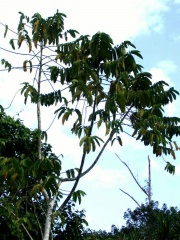Difference between revisions of "Castilla rubber"
Jump to navigation
Jump to search
(username removed) |
m (Text replace - "== Authority ==" to "== Sources Checked for Data in Record ==") |
||
| Line 12: | Line 12: | ||
G.S.Brady, ''Materials Handbook'', 10th edition, McGraw-Hill, New York, 1971. | G.S.Brady, ''Materials Handbook'', 10th edition, McGraw-Hill, New York, 1971. | ||
| − | == | + | == Sources Checked for Data in Record == |
* G.S.Brady, ''Materials Handbook'', McGraw-Hill Book Co., New York, 1971 Comment: p. 675 | * G.S.Brady, ''Materials Handbook'', McGraw-Hill Book Co., New York, 1971 Comment: p. 675 | ||
Revision as of 14:39, 29 April 2016
Description
A rubbery exudation obtained from the Castilla elastica tree native to Mexico, Central America and the Caribbean. Castilla rubber was used by the Maya and Caribbeans. Later, when it was cultivated in Panama for exportation, it became known as Panama rubber. The latex and rubber are identical to hevea rubber after purification (Brady 1971).
Synonyms and Related Terms
Castilla elastica; caucho de Castilla (Esp.); Panama rubber; castilloa, castila (sp.)
Additional Information
G.S.Brady, Materials Handbook, 10th edition, McGraw-Hill, New York, 1971.
Sources Checked for Data in Record
- G.S.Brady, Materials Handbook, McGraw-Hill Book Co., New York, 1971 Comment: p. 675
- Meredith Montague, contributed information, 1998
